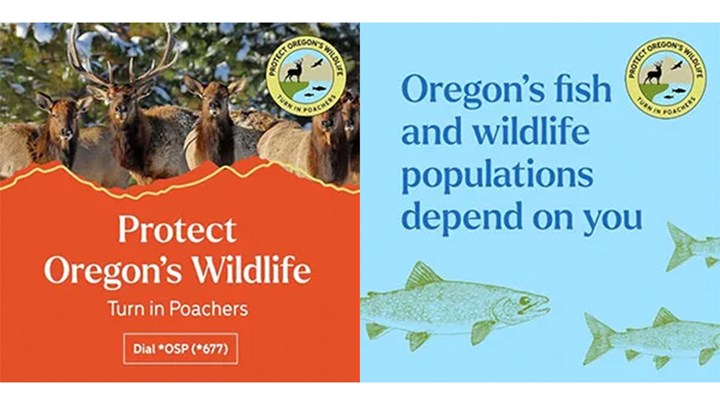
by Brian McCombie - Monday, April 1, 2024

The illegal taking of wildlife, commonly known as poaching, continues to be a problem for wildlife managers, hunters and conservationists. Yet, how much does the general public know about poaching as an actual problem? And what can be done to educate the public about the need to report poaching crimes to the authorities?
New research performed by the international public-opinion-and-attitude survey research firm Responsive Management not only examined the public’s knowledge of poaching in one state, but highlighted ways game agencies can get the word out that poaching is a real problem—and one the public can do something about by getting involved.
One unfortunate reality is that poaching and legal, regulated, scientifically based hunting are too often conflated as one in the same, especially in the mainstream media. Not true. Therefore, educating the public about what poaching is and is not can only help society to see and understand hunting in a more positive light.
The Oregon Connection
According to the Oregon State Police, more than 118,000 individual animals were illegally taken in Oregon since 2012. In 2021 alone, more than 7,000 animals were poached here. These numbers are likely conservative, too, as some research suggests only a fraction of all poaching offenses end up being investigated and prosecuted.
What to do about this problem?
The Oregon Department of Fish and Wildlife (ODFW) launched a new statewide anti-poaching campaign to raise awareness of poaching and to encourage more recreationists to turn in poachers through its TIP (Turn In Poachers) hotline.
To lay the groundwork for the new campaign, ODFW contracted with Responsive Management, which specializes in outdoor recreation issues, to survey Oregon residents' attitudes and opinions on poaching. Responsive Management’s research looked at the underlying reasons why people choose to report or not report poachers. It also determined the most effective phrases and messages that resonate with Oregonians that might encourage them to take action against poachers.
“As communicators about hunting and conservation, we are very aware of the importance of separating legal hunting from the crime of poaching,” Duda told the NRA Hunters’ Leadership Forum website, NRAHLF.org. “This was something we did at the outset of the focus groups and surveys with Oregon residents, just to make sure everyone was on the same page in terms of the research topic.”
He added: “I will say, though, that most of the people we spoke with seemed to already grasp the difference, which speaks to how proactive and effective the Oregon Department of Fish and Wildlife has been in its communications efforts about poaching over the years."
Survey Results
Responsive Management then completed a scientific survey of adult Oregon residents and Oregon conservation stakeholders. Some of the survey’s major findings include:
Digitally Communicating the Message
Duda’s work found that most effective anti-poaching messages were those that explicitly mention “Oregon’s fish and wildlife,” as well as the word “protect.”
Responsive Management's survey was instrumental in providing a scientific look at Oregonians' opinions on poaching, how they think resources ought to be allocated and the general relevance of poaching as a crime,” said Yvonne Shaw, the Protect Oregon's Wildlife—Turn In Poachers campaign coordinator with ODFW. “With the statistical data in hand, we were able to draft meaningful messages that resonate with Oregon’s hunting and non-hunting communities alike.”
That research was immediately put into action by a creative team at Quinn Thomas, an Oregon-based marketing and communications firm hired by ODFW to design and implement the state’s new anti-poaching campaign and develop a Protect Oregon’s Wildlife—Turn In Poachers website and related marketing materials (as shown in the above photo). The result: The campaign generated an amazing 5 million views in just 90 days. To visit the website, click here.
“Responsive Management can do what we do best, which is to design and implement a comprehensive research study, and then the communications professionals can translate the research into action,” said Duda “The material created by Quinn Thomas capitalized on many of the most resonant phrases and messages identified in the research. A solid foundation of scientific research led to millions of initial views for the ad campaign and at least a hundred thousand advertising clicks.
The tremendous response from those surveyed provides hope that public knowledge of poaching is increasing in Oregon and beyond as more people grasp the seriousness of the problem and work to combat it. Every hunter in America can help by talking with nonhunters in their own communities about how poaching is not hunting and that poachers are not hunters.
About Responsive Management
Founded and operated by lifelong hunter and certified wildlife biologist Mark Damian Duda, Responsive Management is an internationally known public-opinion-and-attitude survey research firm specializing in outdoor recreation issues. Duda has a master’s degree in natural resource policy from Yale University and, to date, has conducted more than 1,000 outdoor-related studies, including for the NRA. He is also the author of four books on wildlife and outdoor recreation and more than 150 published articles and peer-reviewed papers.
E-mail your comments/questions about this site to:
[email protected]
Proudly supported by The NRA Foundation and Friends of NRA fundraising.
